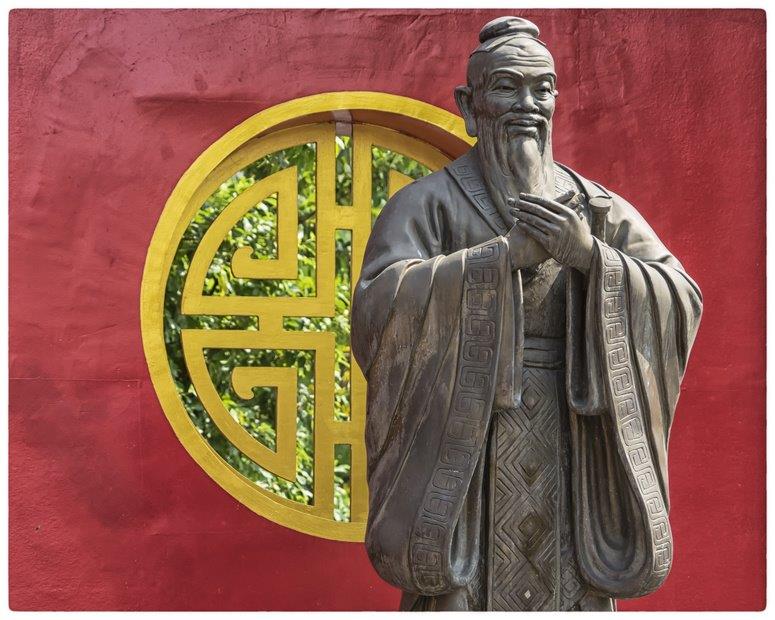Confucius in China, Korea, Japan
What a mistake to believe that we can approach Asian countries influenced by Confucius in the same way! Each of them requires its own approach.

The impact of Confucianism in China, Korea, Japan
If the teachings of Confucius deeply mark the culture of Asian countries, Confucian values alone do not allow us to apprehend these countries as a unique whole.
Unfamiliar with Confucian concepts, we are often in the habit of taking them as a whole that would apply uniformly to all the countries of the Far East. This simplification even gave rise in the late 1990s to the concept of "Asian values", which are supposed to be the key to the success of emerging countries.
This corpus of values encompasses the search for a harmonious society, collective well-being, loyalty and respect for authority figures, and finally a strong appetite for the collective and communitarianism.
A simplifying prism
However, businessmen who have some experience of these countries are well aware that it is a simplifying trap to try to explain these cultures by the sole prism of this corpus.
André Chieng, in La pratique de la Chine, wonders: "For a Chinese, working in a Japanese company represents (...) a trying constraint. How to explain this phenomenon?"
While Confucian values are shared by both countries, and respect for hierarchy is a central value of Chinese and Japanese organizations, one might expect an ease of acculturation for Chinese employees.
It was a Japanese academic who pointed out to him that "both the Chinese and Japanese people are followers of Confucius, but each of them has retained in the master's teaching what best fits their personality."
Confucian values adapted by each culture
In China: "REN" = man in society
Thus in China, the value shared by all is Ren (仁). The sinogram represents the key to man (人) and the number two (二). In short, it is man in society. As Anne Cheng points out in History of Chinese Thought, Confucius was careful not to define precisely what he meant by this notion.
The Chinese thinkers who succeeded him strove to better define this concept. Ren (仁) is benevolence towards the other, the sense of the human. Anne Cheng to specify: "it is man as a moral being in the network of his relations with others, whose complexity yet harmony is the image of the universe itself."
In the Chinese world, it is no surprise that man is at the heart of everything.
In Korea: "XIAO" = filial piety + "ZHONG" = loyalty
Korea discovered the teachings of Confucius and Buddha at the same time. Thus, Confucian thought developed in its own way with an original approach where Buddhism and Confucianism mutually enrich each other.
From the 14th century onwards, the writings of the Chinese neo-Confucian Zhu Xi had a profound impact on the development of Korean thought. From this time on, filial piety is the fundamental notion inculcated in children: Xiao (孝) pronounced hyo in Korean (효). The keystone of Ren (仁), filial piety, Xiao (孝) dictates many acts of every Korean.
During the periods of dictatorship after World War II, the dictator Park (in power from 1962-79) extended the notion of filial piety to teachers, business, government by associating with it the value of loyalty, Zhong (忠) pronounced jung in Korean (충).
Today Korea is characterized, in comparison to China, by this Xiao/Zhong duality, filial piety and loyalty.
In Japan: "ZHONG" = loyalty + "XIN" = integrity
In Japan, Zhong (忠) is the value of samurai. The samurai is the man who serves the local lord; this is the very etymology of his name (saburau means to serve).
This is the value that early 20th century military manuals insist on, unlike Chinese manuals which themselves prefer Ren (仁) as André Chieng points out. But in the Confucian approach, the Zhong (忠) is above all a limitless demand on oneself. The heart (心) positioned on the central axis (中) recalls "the notion of centrality precisely at the heart of Confucian thinking about what makes us human" according to Anne Cheng. The story of the 47 ronins who remain loyal to their master, avenging him at the risk of their lives is exemplary in this respect, proof of extreme loyalty.
But Japanese society as a whole does not recognize itself in the values carried by the samurai or the army. Indeed a large fringe of the population is more attached to integrity, the Xin (信). The man (人) facing his word (言), an alignment between what he says and what he does. This is a universal value in Japan detached from the samurai spirit of loyalty.
American journalist Jake Adelstein when recounting his special relationship with the organized crime scene, the Yakuza, insists that they kept their word: "Over time I learned that if you say something to these guys, 'I'm going to call you,' you better do it. Every time you say you're going to do something, you do it. That way you build credibility with them."
Anne Cheng elaborates on Xin (信), "This integrity that makes a man trustworthy is itself the condition for his integration into the social body." As in Korea, then, there is also a duality. But in Japan it revolves around Zhong (忠) and Xin (信), loyalty and integrity.
So the influence of Confucius was different in China, Korea, Japan
These countries are still under the influence of the master, even today. For example, Japanese children enjoy watching a cartoon on television with heroes who each represent one of the five constants; the moral at the end of the episode illustrates Confucian morality.
In addition to the five constants (humanity, justice, respect for rituals, knowledge, integrity) and the four virtues (loyalty, filial piety, determination, fidelity), each of these three countries has emphasized a specific point: the sense of humanity for China, filial piety and loyalty for Korea, loyalty and integrity for Japan.
It is essential to keep in mind that although China, Korea and Japan can be called Confucian countries, they have not been influenced in the same way by the master's teachings.
So when you are asked to intervene in one of these countries, you will be judged by this influence. It is important to keep in mind that each country requires its own approach.
Bibliography
- Tokyo Vice, Jake Adelstein, Pantheon Books, 2009
- Histoire de la pensée chinoise, Anne Cheng, Seuil, 1997
- The practice of China, André Chieng, Grasset, 2006
- Les 47 rônins, George Soulié de Morant, Budo éditions, 2006
